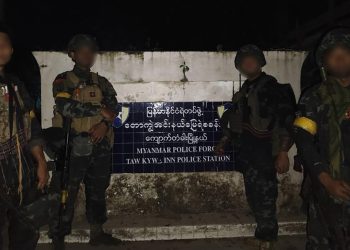An alliance of ethnic armed groups that has been fighting the Myanmar military in the northeast and west of the country has extended its unilateral ceasefire until the end of this year, it said in a statement on Friday.
The alliance comprises the Myanmar National Democratic Alliance Army (MNDAA), the Ta’ang National Liberation Army (TNLA) and the Arakan Army (AA).
The move came one day ahead of the expiration of the Myanmar military’s own truce on Sept. 21. Observers described the armed groups’ ceasefire extension as a shrewd political move.
The groups “gain a political advantage by announcing the ceasefire,” said U Maung Maung Soe, an ethnic affairs analyst. “While we can’t say for sure whether the fighting will totally stop, the military tensions in Rakhine and northern Shan states are easing,” he said.
“It is a response to the military truce,” said Dr. Min Zaw Oo, the director of the Myanmar Institute for Peace and Security. Unlike earlier, he said, the groups now seem to “be serious about the ceasefire”, albeit with conditions.
It is not yet known whether the Myanmar military (or Tatmadaw) will extend for a fourth time its truce in five military commands covering Shan and Kachin states. The military declared the truce—which excludes conflict-torn Rakhine State in western Myanmar—on Dec. 21, 2018, and extended it in April, June and August. Sources close to the military expect Rakhine will again be left out, even if the Tatmadaw extends its truce on Saturday.
According to their Friday announcement, the alliance’s unilateral ceasefire extension is effective until Dec. 31. The alliance announced the initial Sept. 9-Oct. 8. ceasefire last week.
The groups said the extension is aimed at facilitating the negotiation of bilateral ceasefire agreements, and reducing the fighting. “Our triple Brotherhood Alliance is ready to enforce a joint ceasefire if the Myanmar Tatmadaw is willing,” the statement reads.
However, they maintained their right to defend themselves if the Tatmadaw attacked their troops or camps, or conducted military operations in their territories; launched mortar, artillery or airstrikes in situations where the two sides’ troops were not directly engaged; or targeted civilians or blocked internally displaced persons (IDPs) from accessing food.
U Khin Zaw Oo, the secretary of the Peace Commission, described the statement as “constructive” and “a result of our negotiations.”
The latest discussions between government negotiators and representatives of the Northern Alliance, which comprises the Kachin Independence Army, MNDAA, TNLA and AA, were held in Kengtung, eastern Shan State on Tuesday.
Fighting in the area has intensified since November despite peace talks between the government’s negotiators and the Northern Alliance, organized with help from China.
The MNDAA, TNLA, and AA have troops operating in northern Shan State, and the AA also operates in Rakhine State. Clashes have occurred in Rakhine State since the AA first gained a foothold there in 2015, and began to intensify in November last year.
The peace talks resumed on Aug. 31 after the Brotherhood Alliance, as the three groups refer to themselves, staged attacks on military and civilian targets on Aug. 15, killing 15 people including military and police personnel, as well as civilians. The attacks also seriously disrupted trade routes bound for the Muse trading zone on the China-Myanmar border in Shan State.

















